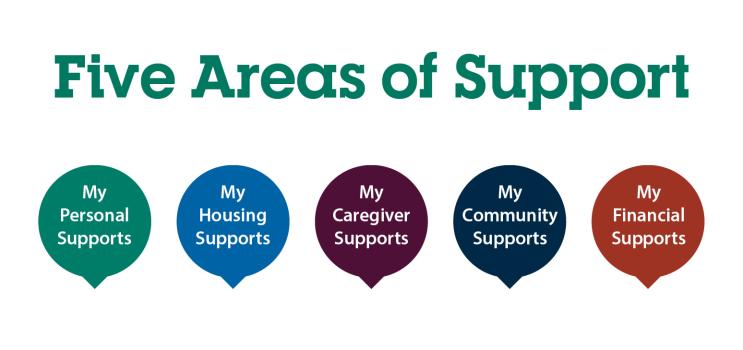AccessAbility Supports

AccessAbility Supports focus on empowering individuals and their families living with disabilities to access the tools they need to reach their full potential and contribute to society as fully as possible.
Disabilities may include physical, intellectual, neurological, sensory and mental disabilities.
What type of support is available?
Help is available under five areas of support, as follows:
Personal Supports
Personal Supports help with personal daily living assistance such as:
- Life skills training in areas like meal preparation, budgeting, grocery shopping, recreational activities;
- Technical aids and assistive devices such as a wheelchair;
- Supports that enable an individual to be self-sufficient and live independently such as in-home supports or personal care workers; and
- Specialized care supports to assist with extraordinary care needs.
Housing Supports
Housing Supports help with independent living and may include assistance such as:
- Vehicle Modifications Funding to primary vehicle directly related to disability needs as determined by a licensed Occupational Therapist and adhering to the AAS funding parameters. Maximum funding is $6,000 every 8 years;
- Residential Supports to a paid caregiver to provide daily supervision and guidance in a community-based residential setting; and
- Home Modifications Funding for making modifications to primary residence directly related to disability needs as determined by a licensed Occupational Therapist and adhering to the AAS funding parameter. Maximum funding is $10,000 every 10 years.
Community Supports
Community Supports help increase active participation in the community and may include:
- Community/Peer connection supports for applicants over the age of 12 to establish connections with peers in a group environment. The goal of peer connection is to establish social interactions which can be maintained by the individual and/or family;
- Community participation supports for applicants to participate in the community, such as day programming, a personal support worker, or specialized transportation needs; and
- Peer supports help workers working closely with an applicant with a disability who is over the age of 18 to develop, implement, monitor and adapt their life plans as their circumstances change.
Caregiver Supports
Caregiver Supports help family members or caregivers and may include:
- Supervision funding for applicants over the age of 12 who cannot safely be left alone, enabling the primary care provider(s) to attend school or work;
- Respite funding for eligible applicants to provide temporary relief for caregivers from full care and supervision demands, while facilitating a positive experience for the person with a disability. The maximum amount of respite funding is based on the applicant’s capability assessment, to a limit of $430 per month; and
- Behavioural supports help to provide focused interventions for teaching/modelling functional social skills and targeting improvement in non-normative social behaviours related to the safety of self or others.
Financial Supports
Financial Supports help with basic living expenses, if needed, and may include:
- Assistance for basic needs such as food, clothing, shelter, household, and personal supplies through what is called Assured Income.
How can I get support?
You will meet with a staff person who will conduct an assessment to determine how disability affects your daily life and how AccessAbility Supports can help meet your needs.
For more detailed information download the AccessAbility Supports Handbook.
Questions?
Call toll-free in Prince Edward Island:
1-877-569-0546